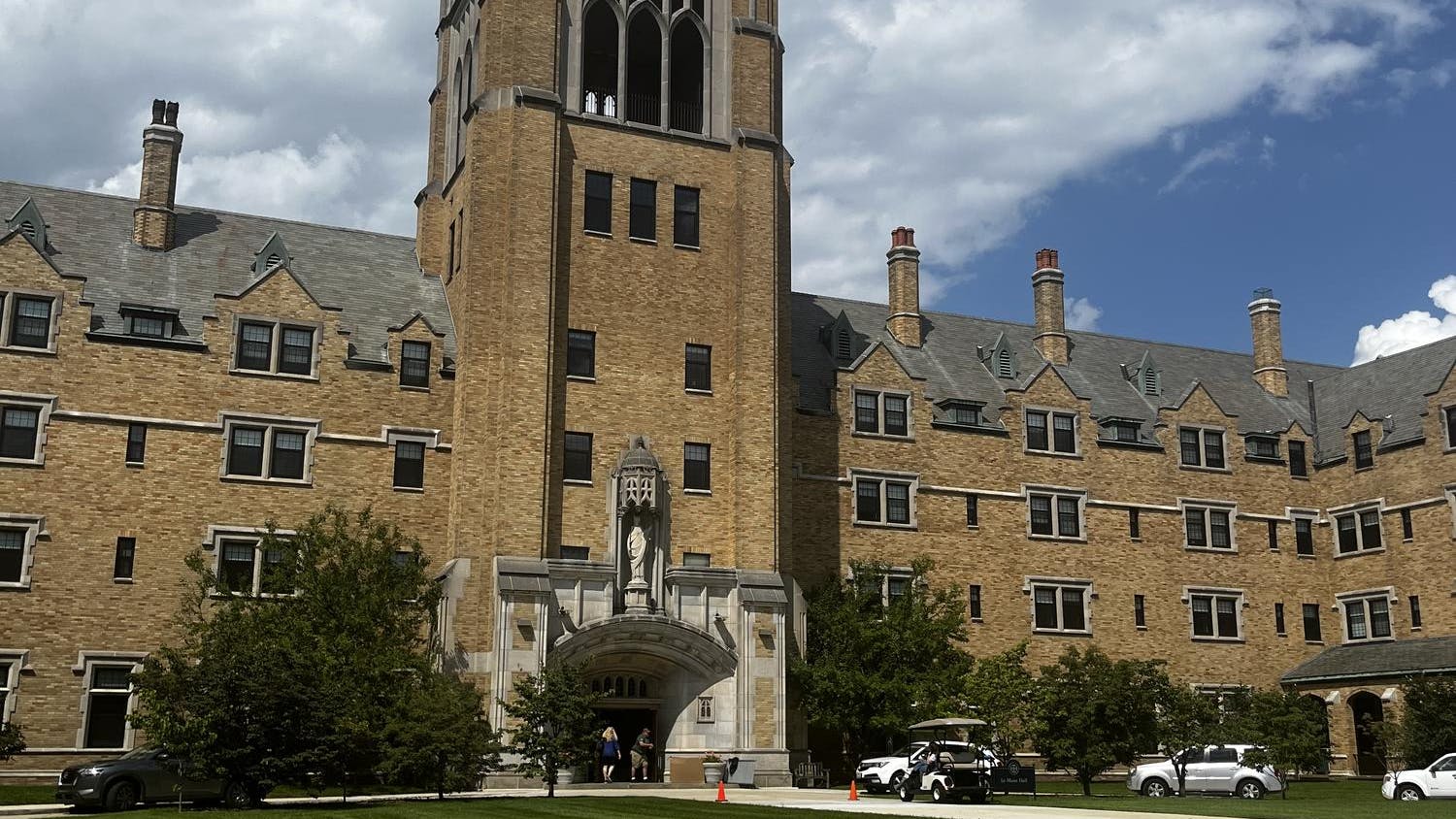Jay Bhattacharya, an epidemiologist and economist from Stanford, was “blacklisted” by Twitter the day he joined the app. He carries a business card identifying himself as a “fringe epidemiologist,” quoting an email from Francis Collins, then the director of the National Institutes of Health, to Anthony Fauci. Bhattacharya, an academic at the center of many of the nation’s debates over lockdowns, delivered an address Tuesday night to an event hosted by the economics department.
Bhattacharya was introduced by economics department chair Eric Sims as someone whose “views have not always been popular, and have sometimes contradicted official messaging from governments and public health professionals.”

Sims pointed out that Bhattacharya’s advocacy has been rooted in the economic principle of tradeoffs, as well as following the science where it led him.
“In his work and in his commentary, Dr. Bhattacharya has questioned the wisdom of widespread masking and lockdowns, pointing to the high potential costs to society and noting that the benefits of such mitigation strategies might be smaller than belief,” Sims said. “He's been courageous in speaking out for what he believes and what the science tells him, and he's become an outspoken proponent of the principles of free speech and academic freedom.”
Speaking in the DeBartolo Performing Arts Center’s Decio Theatre, Bhattacharya discussed the adverse effects of pandemic policy, emphasizing that for many of these effects, the blame lay not in the virus but in the decision to put lockdowns in place, which he deemed “an unnecessary overreaction.”
Bhattacharya spoke about his childhood visits to the Kolkata slum his mother grew up in and the rural hospital he spent a year at while a medical student as representations of global poverty’s manifestations in India.
He also recalled the panic over the H1N1 swine flu epidemic in 2009, remembering how the panic subsided when the infection fatality rate was revealed to be much lower than previously expected.
These two pieces of background led to Bhattacharya’s skepticism around COVID-era public policy. This ultimately brought his voice to the forefront of an international conversation around the virus.

Conducting a series of studies early in the pandemic identifying the infection fatality rate, Bhattacharya and his colleagues found that a far higher number of people had antibodies for the virus than expected, meaning that far more people had COVID-19 than hospitalizations indicated, and a far smaller percentage were experiencing severe disease or death. He argued not only that the risk was lower than expected, but that decisions were made in a one-size-fits-all manner.
“We knew early in the pandemic exactly where the risk was, there’s a thousand-fold or more difference in the risk of dying from infection from the youngest to the oldest,” Bhattacharya said. “But the public health messaging was that we're all in it together and that young people needed to sacrifice their lives in order to protect older people. The decision was made without really a discussion of the population at large.”
He then went through cases in which the policy response to COVID-19 caused harm across the globe.
Cataloging a dramatic rise in extreme poverty, Bhattacharya cited a World Bank report to argue that the advances made by globalism and development economics had been pulled back, pushing millions of people into starvation.
“Now when they wrote this, they wrote it saying that the pandemic caused this, that the virus caused this, but this is not the pandemic. This is not the virus. This was the decision by Western governments to lock down, which had knock-on economic consequences around the world,” he said.
“We reversed a generation of poverty reduction with the decision to lockdown,” he continued.
Chronicling the ways in which other health efforts — such as measles and polio vaccination in Africa and cancer screenings around the world — were put on the back burner as part of the COVID-19 response, he demonstrated how deaths had risen related to those conditions.
Because of the relatively young population in the continent, “COVID is like 1 million on the list of problems Africa faces. What's high on the list of the problems Africa faces are problems of poverty, problems of other diseases that just don't spread in Western countries: measles, polio,” Bhattacharya said. He argued that the global approach to managing the COVID-19 pandemic allowed those diseases and others like tuberculosis to reemerge in extreme ways, particularly among the poor.
School closures were also discussed. He described Uganda’s experience, where millions of children were completely removed from school for two years, with no internet or Zoom to provide a substitute for in-person education. Many of the families were pushed further into poverty, feeding into issues of sex trafficking and child labor. Millions of students in Uganda will never return to school as a result of the extended lockdowns and economic reverberations, Bhattacharya claimed.
He contrasted the American approach with the Swedish approach, where children were in-person for school with “no disruption, no masks” and no student fatalities were reported. Teachers in the country, Bhattacharya said, were similarly unlikely to see fatality.
He continued his “depressing litany” of statistics with mental health harms and the exponential rise in serious suicidal ideation among young people.
Bhattacharya ultimately said lockdown policies were “at the luxury of the laptop class,” driving global and domestic inequalities far deeper.
Discussing COVID-19 and the ways in which churches responded, Bhattacharya said considerations of human equality and dignity were challenged by the pandemic response.
“We have commitments that we've made to each other about the importance of fellowship with the importance of communion, the importance of mass in the Catholic Church. The question is, how important are those commitments?” he asked. “The message I heard from some of the churches, that treating each other as biohazards is an act of love. I don't think that's the right message. I’m a Christian. I don't think that's the message I believe.”
Following his address, Bhattacharya answered audience questions. Junior Merlot Fogarty asked about the University’s booster mandate, requiring students to receive their fourth shot. Bhattacharya called the decision “a bad idea.”
“I don’t think there’s almost any benefit for the vast majority of people here,” he said. Bhattacharya pointed to scientific arguments against requiring further doses, as well as the approach taken in Norway and Denmark, where only those above 50 are given the booster unless for some medical reason urged by their doctor.
Bhattacharya called for a reckoning among his field and scientific bureaucrats who had shut down academic debate over the issues at hand.
“The starting point is an open acknowledgment of error,” he said. “Until that happens, there's no chance of gaining back the trust of the majority. No matter what your position on lockdowns and whatever are, it’s clear we failed. It's very clear that we didn't stop many people from getting COVID.”
Contact Isa Sheikh at isheikh@nd.edu.












